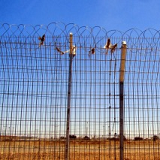 by-Hagai-Elad
by-Hagai-EladDear Friends,
On a global scale, for every minute in 2015, 24 people were forced to flee their homes and become displaced persons or refugees. One out of 113 people in the world is a displaced person or a refugee, and 51% of the world’s refugees are children. In the past year alone, the number of people fleeing from their homes hit a record 65.3 million people. These worrying statistics were released this week by the UNHCR to mark World Refugee Day on 20 June.
What is happening in Israel? Most of those entitled to international protection in Israel are from Eritrea or Sudan, and these 40,000 people live in crowded slums. Israel recognizes that it cannot forcibly deport them to their home countries, but is actively working in various ways to make their lives here impossible, so that they will voluntarily choose to leave. To this day Israel has formally granted only four people from Eritrea with refugee status. Not one, single person from Sudan has been recognized by Israel as a refugee, including people who escaped the genocide in Darfur.
“Holot”, a holding facility, which the authorities have crammed with more than 3,000 asylum seekers, is an especially unfortunate testimony of the Israeli government’s attitudes towards those who are entitled to protection. It is located inside Ketziot Prison in the desert and far away from all major cities and towns. Detainees are forbidden from working and most of the time they do not have money for public transport. As a result, most of the detainees cannot leave Holot and spend most of their time in and around the facility.
In recent weeks ACRI, in partnership with other civil society organizations submitted a series of petitions to the High Court calling for the State to address the seriously poor conditions at Holot: the considerable crowdedness in the rooms; the ban on bringing in personal equipment; the unsatisfactory facilities provided by the Israel Prison Service; the lack of educational and recreational activities; the lack of computers; and the disgraceful service of the Population and Immigration Authority within the facility. These petitions were added to the petition the ACRI submitted one year ago regarding the ban on bringing food into the facility – which is especially difficult for detainees at the moment, during the month of Ramadan.
The resources invested in detention could be better invested in solutions that would benefit both asylum seekers and the citizens of Israel. For example, permitting asylum seekers to work in places where there is a labor shortage; providing incentives for employers to absorb refugees in different places; and providing refugees with access to health care, welfare and education across the country. At the same time the State could invest in improving services, infrastructure and personal security in the southern suburbs of Tel Aviv.
Yours,
Sharon
![]()
Sharon Abraham-Weiss
Executive Director
The Association for Civil Rights in Israel







